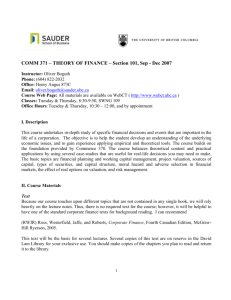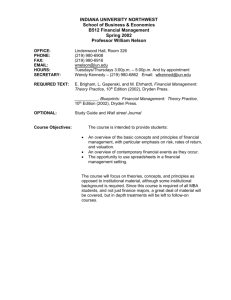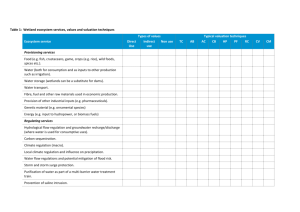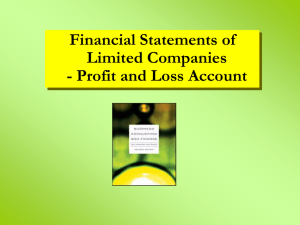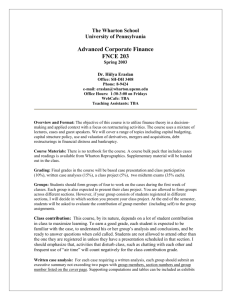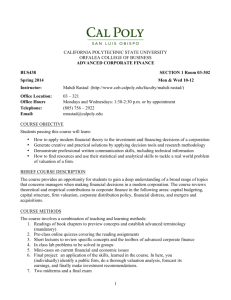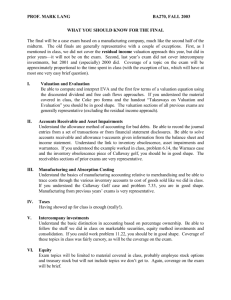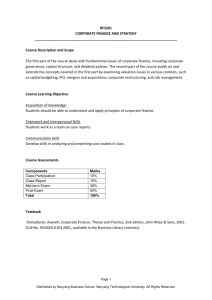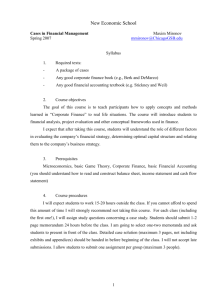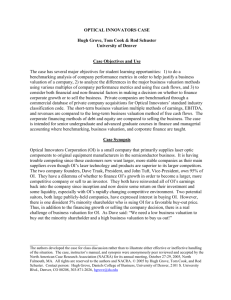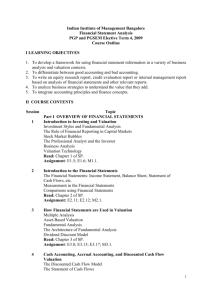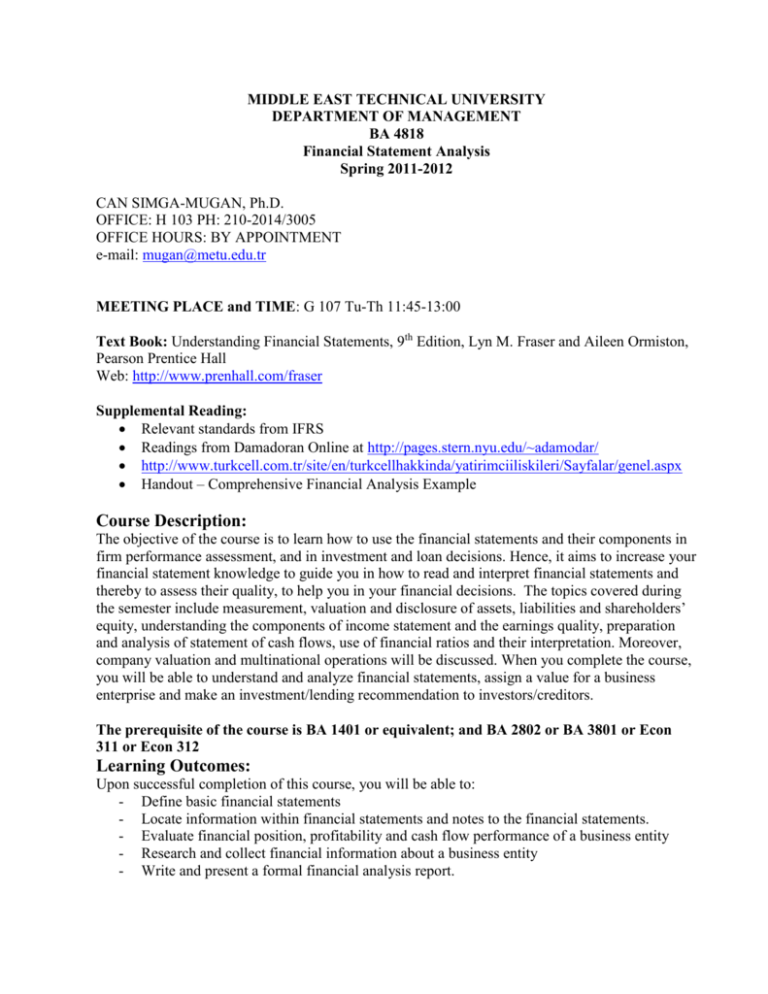
MIDDLE EAST TECHNICAL UNIVERSITY
DEPARTMENT OF MANAGEMENT
BA 4818
Financial Statement Analysis
Spring 2011-2012
CAN SIMGA-MUGAN, Ph.D.
OFFICE: H 103 PH: 210-2014/3005
OFFICE HOURS: BY APPOINTMENT
e-mail: mugan@metu.edu.tr
MEETING PLACE and TIME: G 107 Tu-Th 11:45-13:00
Text Book: Understanding Financial Statements, 9th Edition, Lyn M. Fraser and Aileen Ormiston,
Pearson Prentice Hall
Web: http://www.prenhall.com/fraser
Supplemental Reading:
Relevant standards from IFRS
Readings from Damadoran Online at http://pages.stern.nyu.edu/~adamodar/
http://www.turkcell.com.tr/site/en/turkcellhakkinda/yatirimciiliskileri/Sayfalar/genel.aspx
Handout – Comprehensive Financial Analysis Example
Course Description:
The objective of the course is to learn how to use the financial statements and their components in
firm performance assessment, and in investment and loan decisions. Hence, it aims to increase your
financial statement knowledge to guide you in how to read and interpret financial statements and
thereby to assess their quality, to help you in your financial decisions. The topics covered during
the semester include measurement, valuation and disclosure of assets, liabilities and shareholders’
equity, understanding the components of income statement and the earnings quality, preparation
and analysis of statement of cash flows, use of financial ratios and their interpretation. Moreover,
company valuation and multinational operations will be discussed. When you complete the course,
you will be able to understand and analyze financial statements, assign a value for a business
enterprise and make an investment/lending recommendation to investors/creditors.
The prerequisite of the course is BA 1401 or equivalent; and BA 2802 or BA 3801 or Econ
311 or Econ 312
Learning Outcomes:
Upon successful completion of this course, you will be able to:
- Define basic financial statements
- Locate information within financial statements and notes to the financial statements.
- Evaluate financial position, profitability and cash flow performance of a business entity
- Research and collect financial information about a business entity
- Write and present a formal financial analysis report.
Assessment and Grading:
The following will be used to assess the learning outcomes:
1. In class participation: Attendance by itself is a necessary but not a sufficient condition to receive a
class participation grade. Active participation will be assessed based on the contribution of the
individuals to class discussions.
2. In class assignments and case studies: There will be in-class assignments and case studies on
selected topics. You are expected to work out questions and analyses within a group. You
may be asked to discuss your findings in class. Therefore, I recommend you to read the
chapter and be ready to ask and answer questions before coming to class. There will be no
make up for in-class assignments and case studies.
3. Term Project: You will be assigned a term project based on a Turkish public company to be chosen
from a list provided by the instructor. The project is a group work where each student is assigned a
company. At the beginning of the semester you are required to form teams with at most 4 members.
4. Midterm and Final Examinations: There will be one midterm and a final examination to evaluate
the students’ course performance. Exams will include problem and essay questions. The questions
will be designed to assess the students’ knowledge of the course content and their critical thinking
abilities. Make up exams are administered only during the finals week as a single comprehensive
exam for the missed midterm and/or final. Therefore, the students are strongly urged to take the
exams on the scheduled dates. Do not forget to take a copy of the legal health report within
three days after the exam to the instructor.
ACADEMIC HONESTY:
All university, faculty, and department principles on academic honesty will be strictly enforced.
The usual consequence for academic dishonesty is failure in the course and additional disciplinary
action. Examinations, homework, and term projects are individual and are to be completed
without unauthorized outside assistance (including un-cited Internet and other sources of
information). Persons observed cheating during examinations will automatically receive a failing
grade in the course. In addition to the consequences above, the instructor will initiate disciplinary
action against the student(s) involved in academic dishonesty.
Grading Policy:
Midterm
Final
Term Project
Presentation
Class Participation
% 25
% 30
% 25
% 10
% 10
TENTATIVE COURSE SCHEDULE
Subject to change when deemed necessary by the instructor
W Week of
1
2
3
4
5
6
7
8
9
10
11
12
13
Topic
16 Feb
Introduction- Overview of Financial
Statements and Analysis
20-24 Feb Analyzing Financing Activities –
liabilities and SHE
27 Feb – 2 Analyzing Investing Activities – Assets
Mar
5-9 Mar
Analyzing Investing Activities –
Intercompany and International
12-16 Mar Analyzing Operating Activities
19-23 Mar Analyzing Cash Flow
26-30 Mar A Guide to Earnings and Financial
Reporting Quality
MIDTERM – April 2- 17:45
2-6 April
Return on Investment and Profitability
9-13 April Credit Analysis and Capital Structure
16-20
Liquidity and Prospective Analysis
April
24 – 27
Firm Valuation
April
30 April – No Class on May 1
4 May
Firm Valuation
7-11 May Firm Valuation
14 14-18
May
15 21-25
May
Presentations
Presentations
FINAL - announced at
www.ba.metu.edu.tr
Reading
Assignment
Chapter 1
Chapter 2
Chapter 2
Handout – Bernstein et al.
Chapter 5
Chapter 3
Chapter 4
Chapter 5
Chapter 6
Chapter 6
Chapter 6- Handout – Bernstein
et al. Chapter 10
Based on Damadoran- DCF –
Valuation -Chapters 1-6
Basen on Damadoran- DCF –
Valuation -Chapters 1-6
Based on Damadoran- DCF –
Valuation -Chapters 1-6


